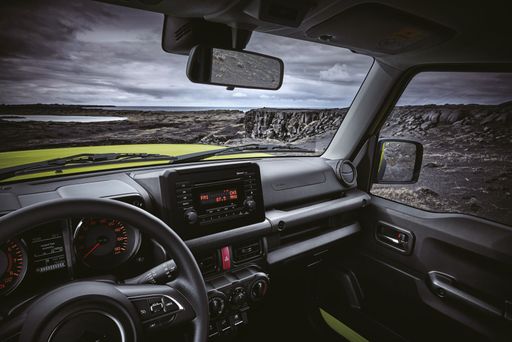Hyundai Kona vs Suzuki Jimny – Which one offers the better deal?
Two cars, one duel: Hyundai Kona meets Suzuki Jimny.
Which one wins in performance, efficiency and value for money? Find out now!
Costs and Efficiency:
When it comes to price and running costs, the biggest differences usually appear. This is often where you see which car fits your budget better in the long run.
Hyundai Kona has a slight advantage in terms of price – it starts at 23100 £, while the Suzuki Jimny costs 25300 £. That’s a price difference of around 2220 £.
Fuel consumption also shows a difference: Hyundai Kona manages with 4.60 L and is therefore convincingly more efficient than the Suzuki Jimny with 7.70 L. The difference is about 3.10 L per 100 km.
Engine and Performance:
Power, torque and acceleration say a lot about how a car feels on the road. This is where you see which model delivers more driving dynamics.
When it comes to engine power, the Hyundai Kona has a decisively edge – offering 218 HP compared to 102 HP. That’s roughly 116 HP more horsepower.
In acceleration from 0 to 100 km/h, the Hyundai Kona is significantly quicker – completing the sprint in 7.80 s, while the Suzuki Jimny takes 12.80 s. That’s about 5 s faster.
In terms of top speed, the Hyundai Kona performs clearly perceptible better – reaching 210 km/h, while the Suzuki Jimny tops out at 145 km/h. The difference is around 65 km/h.
There’s also a difference in torque: Hyundai Kona pulls convincingly stronger with 265 Nm compared to 130 Nm. That’s about 135 Nm difference.
Space and Everyday Use:
Beyond pure performance, interior space and usability matter most in daily life. This is where you see which car is more practical and versatile.
Seats: Hyundai Kona offers clearly more seating capacity – 5 vs 2.
In curb weight, Suzuki Jimny is slightly lighter – 1165 kg compared to 1370 kg. The difference is around 205 kg.
In maximum load capacity, the Hyundai Kona performs evident better – up to 1300 L, which is about 437 L more than the Suzuki Jimny.
When it comes to payload, Hyundai Kona significantly takes the win – 490 kg compared to 270 kg. That’s a difference of about 220 kg.
Who comes out on top?
Overall, the Hyundai Kona shows itself to be leaves the rival little chance and secures the title of DriveDuel Champion.
It convinces with the more balanced overall package and proves to be the more versatile choice for everyday use.
 @ Hyundai Motor Company
@ Hyundai Motor Company
Hyundai Kona
Hyundai Kona
The Hyundai Kona wears its personality on the outside with bold styling and sprightly handling that turns city driving into something a little more fun than a commute. It blends practical space, modern tech and sensible running costs into a compact, stylish package — a smart pick if you want flair without paying luxury prices.
details @ Hyundai Motor Company
@ Hyundai Motor Company
 @ Hyundai Motor Company
@ Hyundai Motor Company
 @ Hyundai Motor Company
@ Hyundai Motor Company
 @ Hyundai Motor Company
@ Hyundai Motor Company
Suzuki Jimny
The Suzuki Jimny is a compact SUV that has gained a loyal following for its rugged charm and off-road capabilities. Its boxy design is both nostalgic and functional, making it stand out in a sea of more streamlined vehicles. Despite its small size, the Jimny offers a surprisingly robust driving experience, ideal for adventurous journeys off the beaten track.
details @ Suzuki Motor Corporation
@ Suzuki Motor Corporation
 @ Suzuki Motor Corporation
@ Suzuki Motor Corporation
 @ Suzuki Motor Corporation
@ Suzuki Motor Corporation
 @ Suzuki Motor Corporation
@ Suzuki Motor Corporation
 @ Hyundai Motor Company
@ Hyundai Motor Company
|
 @ Suzuki Motor Corporation
@ Suzuki Motor Corporation
|
|
|
|
Costs and Consumption |
|
|---|---|
|
Price
23100 - 41600 £
|
Price
25300 - 27700 £
|
|
Consumption L/100km
4.6 - 7 L
|
Consumption L/100km
7.70 L
|
|
Consumption kWh/100km
14.6 - 16.8 kWh
|
Consumption kWh/100km
-
|
|
Electric Range
377 - 514 km
|
Electric Range
-
|
|
Battery Capacity
1.3 - 65.4 kWh
|
Battery Capacity
-
|
|
co2
0 - 163 g/km
|
co2
173 g/km
|
|
Fuel tank capacity
38 - 47 L
|
Fuel tank capacity
40 L
|
Dimensions and Body |
|
|---|---|
|
Body Type
SUV
|
Body Type
Off-Roader
|
|
Seats
5
|
Seats
2
|
|
Doors
5
|
Doors
3
|
|
Curb weight
1370 - 1773 kg
|
Curb weight
1165 kg
|
|
Trunk capacity
466 L
|
Trunk capacity
-
|
|
Length
4350 - 4385 mm
|
Length
3645 mm
|
|
Width
1825 mm
|
Width
1645 mm
|
|
Height
1580 - 1585 mm
|
Height
1705 mm
|
|
Max trunk capacity
1300 L
|
Max trunk capacity
863 L
|
|
Payload
420 - 490 kg
|
Payload
270 kg
|
Engine and Performance |
|
|---|---|
|
Engine Type
Electric, Petrol, Full Hybrid
|
Engine Type
Petrol
|
|
Transmission
Automatic, Manuel
|
Transmission
Manuel
|
|
Transmission Detail
Manual Gearbox, Dual-Clutch Automatic
|
Transmission Detail
Manual Gearbox
|
|
Drive Type
Front-Wheel Drive, All-Wheel Drive
|
Drive Type
All-Wheel Drive
|
|
Power HP
115 - 218 HP
|
Power HP
102 HP
|
|
Acceleration 0-100km/h
7.8 - 11.9 s
|
Acceleration 0-100km/h
12.80 s
|
|
Max Speed
162 - 210 km/h
|
Max Speed
145 km/h
|
|
Torque
200 - 265 Nm
|
Torque
130 Nm
|
|
Number of Cylinders
3 - 4
|
Number of Cylinders
4
|
|
Power kW
85 - 160 kW
|
Power kW
75 kW
|
|
Engine capacity
998 - 1598 cm3
|
Engine capacity
1462 cm3
|
General |
|
|---|---|
|
Model Year
2024 - 2025
|
Model Year
2021 - 2024
|
|
CO2 Efficiency Class
A, D, C, E, F
|
CO2 Efficiency Class
F
|
|
Brand
Hyundai
|
Brand
Suzuki
|
Is the Hyundai Kona offered with different drivetrains?
Available configurations include Front-Wheel Drive or All-Wheel Drive.
The prices and data displayed are estimates based on German list prices and may vary by country. This information is not legally binding.
